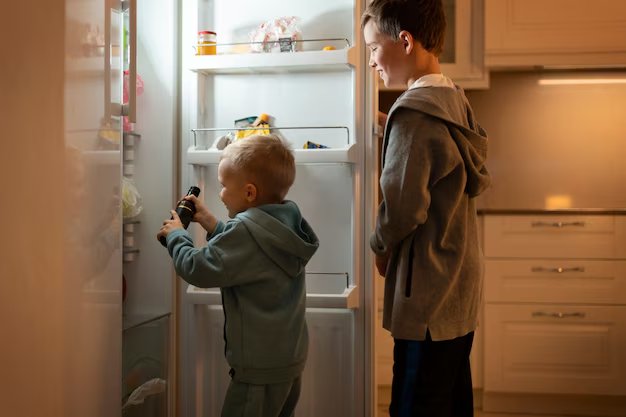How to Maximize the Shelf Life of Scrambled Eggs in the Refrigerator 🍳
Are you ever puzzled about how long leftovers, especially scrambled eggs, can safely last in the refrigerator? This question isn't just about preserving taste and texture; it's about ensuring food safety. Whether you're storing a weekend brunch leftover or preparing a batch for a week's easy breakfast, knowing how to properly store your scrambled eggs can save you from food waste and potential health risks.
Understanding the Shelf Life of Scrambled Eggs
Scrambled eggs, like many cooked foods, have a defined shelf life when kept in the refrigerator. Typically, refrigerated scrambled eggs can last for 3 to 4 days. However, this duration depends on several factors, including the storage method and temperature consistency.
Key Factors Influencing Shelf Life
Several components influence how long your scrambled eggs will remain fresh and safe to consume:
Refrigerator Temperature: Always ensure your fridge is set at or below 40°F. This slows down bacterial growth, which is essential for food safety.
Storage Container: Use airtight containers to minimize exposure to air, which can lead to contamination and spoilage. Glass containers are often recommended as they don't absorb odors and flavors.
Prompt Refrigeration: Aim to refrigerate your scrambled eggs within two hours of cooking to ensure freshness and reduce the risk of bacteria.
The Science Behind Egg Storage 🥚
Why Eggs Spoil
When eggs are cooked, their natural preservation features weaken, leaving them susceptible to bacteria such as Salmonella. Proper cooking kills most bacteria, but improper storage allows any remaining bacteria to grow.
Signs Your Scrambled Eggs Have Gone Bad
Visual and olfactory cues can help determine whether scrambled eggs are no longer safe to eat:
Smell: A sour, sulfur-like smell is a strong indicator of spoilage.
Appearance: Discoloration or a slimy texture suggests that bacteria have proliferated.
Taste: Though tasting should be the last resort, a strange or off-taste indicates spoilage.
Best Practices for Maximizing Freshness
Implement these strategies to ensure your scrambled eggs stay fresh and safe for consumption as long as possible:
1. Storage Solutions
Airtight Containers: These are crucial to keep moisture and contaminants out. Always choose BPA-free and food-safe containers.
Label with Dates: Keep track of when the eggs were cooked and refrigerated to avoid consuming them beyond their safe period.
2. Temperature Control
Consistent Refrigeration: Minimize the number of times you open the fridge to maintain a stable internal temperature.
Alternative Cooling: During hot weather, consider cooling scrambled eggs down quickly before refrigerating them by placing them in a shallow dish over ice.
Beyond Scrambled Eggs: Storage Tips for Other Types of Eggs
It's useful to compare how different egg preparations are stored to better understand scrambled egg storage:
Raw Eggs: Stay safe for about 3 to 5 weeks in the carton.
Boiled Eggs: Last about a week; peeling prior to storage can reduce longevity.
Egg-Based Dishes: Generally last 3-4 days, similar to scrambled eggs, due to mixed ingredients.
Safe Reheating Practices
When it comes to reheating scrambled eggs, following the correct methods is vital to preserve taste and safety:
Microwave Reheating: Use moderate heat and stir frequently to ensure even heat distribution.
Stovetop: For better texture, reheat on low heat until thoroughly warmed.
Creative Ways to Use Leftover Scrambled Eggs
Finally, to avoid waste, here's how you can repurpose leftover scrambled eggs:
Breakfast Burritos: Combine with veggies and wrap in a tortilla for a quick breakfast.
Fried Rice: Mix into rice with soy sauce and diced vegetables.
Salads: Add as a protein-rich topping to salads.
Quick Tips for Egg Safety 🚦
Here’s a summary of crucial tips to keep your scrambled eggs safe and delicious:
- 🕒 Refrigerate Promptly: Store within two hours of cooking.
- 🔒 Use Airtight Containers: Preserve freshness and prevent contamination.
- 📅 Label with Dates: Ensure you eat them within 3 to 4 days.
- 👃 Check for Odors: Discard if there's any sour smell.
- ⚠️ Visual Check: Slimy texture or discoloration indicates spoilage.
By incorporating these strategies into your kitchen routine, you can enjoy scrambled eggs without worry, saving both time and resources. Proper storage of scrambled eggs helps ensure you're not only enjoying your meal but doing so safely. Remember, when it comes to food safety, when in doubt, throw it out!

